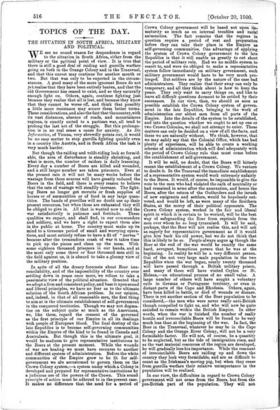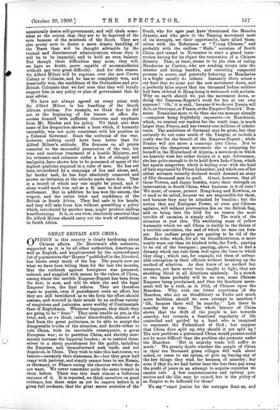TOPICS OF THE DAY.
THE SITUATION IN SOUTH AFRICA, MILITARY AND POLITICAL.
WE see no sound reason for despondence in regard to the situation in South Africa, either from the military or the political point of view. , It is true that there is still a good deal of raiding and guerilla warfare going on both in the Orange Colony and in the Transvaal, and that this unrest may continue for another month or two. But that was only to be expected in the circum- stances. A good many of the more ignorant Boers do not yet realise that they have been entirely beaten, and that the -old Government has ceased to exist, and so they naturally enough fight on. Others, again, continue fighting just because they realise that all is lost, and because they know that they cannot be worse off, and think that possibly a little more resistance may secure them better terms. These considerations, and also the fact that the country,with its vast distances, absence of roads, and mountainous regions, is exactly suited to a partisan war, all tend to prolong the last act of the struggle. But this prolonga- tion is in no real sense a cause for anxiety. As Die Information, of Vienna, very shrewdly points out, it would be no easy matter to stop guerilla fighting quickly even in a country like Austria, and in South Africa the task is very much harder.
But though the raiding and veldt-riding look so formid- able, the area of disturbance is steadily shrinking, and what is more, the number of raiders is daily lessening. Every day a number of Boers are killed and wounded, and a still larger number are taken prisoners. • Even at the present rate it will not be many weeks before the wastage from these sources will have greatly reduced the Boers in the field, and there is every reason to believe that the rate of wastage will steadily increase. The fight- ing Boers no longer get recruits or fresh supplies of horses or of ammunition or of food in any large quan- tities. The bands of guerillas will no doubt use up their present resources, but when these are exhausted they will be obliged to give in. All that is wanted now to end the war satisfactorily is patience and fortitude. These qualities we expect, and shall find, in our commanders and soldiers, and we have a right to expect them also in the public at home. The country must make up its mind to a tiresome period of small and worrying opera- tions, and must entirely refuse to have a fit of " nerves " because after the tremendous crash of war it takes time to pick up the pieces and clean up the mess. With some eighteen thousand prisoners in our hands, and at the most only some three or 'four thousand men still in the field against us, it is absurd to take a gloomy view of the military position.
In spite of all the dreary forecasts about Boer irre- concilability, and of the impossibility of the country ever settling down in peace once more, we refuse to take a pessimistic view of the political situation. Granted that we adopt a firm and consistent policy, and base it upon sound and liberal principles, we have no fear as to the ultimate solution of the South African problem. In our opinion, and, indeed, in that of all reasonable men, the first thing to aim at is the ultimate establishment of self-government in the conquered territories. Though we may not dogma- tise on the subject quite so much as the Americans, we, like them, regard the consent of the governed as the first principle of our Empire in all its dealings with people of European blood. The final destiny of the late Republics is to become self-governing communities within the Empire of the kind to be found in Canada and Australasia. But though this is the ultimate goal, it would be madness to give representative institutions to the Boers at the present moment. While the wounds of war are healing we must have recourse to another and different system of administration. Before the white communities of the Empire grow to be fit for self- government we are accustomed to govern them on the Crown Colony system,—a system under which a Colony is developed and prepared for representative institutions by a judicious use of the powers of the Crown. This sound principle of action must be adhered to in the present case. It makes no difference that the need for a period of Crown Colony government will be based not upon in,. maturity so much as on internal troubles and racial animosities. The fact remains that the regions in question require a period of rest and preparation before they can take their place in the Empire" as self-governing communities. One advantage of applying the system of Crown Colony government to the late Republics is that it will enable us greatly to cut short the period of military rule. Had we no middle system to resort to, and were we obliged to make a representative system follow immediately on military government, such military government would have to be very much pro- longed. But soldiers are by the nature of the case bad administrators. They realise that their sway can only be temporary, and all they think about is how to keep the peace. They only want to carry things on, and like to leave all difficult questions dormant to be settled by their successors. In our view, then, we should as soon as possible establish the Crown Colony system of govern- ment in the late Republics, bringing to the work of administration our ablest men from all parts of the Empire. Into the details of the system to be established, and into the question whether we ought to set up one or two Crown Colonies, we shall not attempt to enter. These matters can only be decided on a view of all the facts, and these we are naturally without. We think, however, that we may safely say that the Colonial Office, which has had plenty of experience, will be able to create a working scheme of administration which will deal adequately with the period of Crown Colony rule that must come before the establishment of self-government.
It will be said, no doubt, that the Boers will bitterly resent the establishment of a Crown Colony. We venture to doubt it. In the Transvaal the immediate establishment of a representative system would work extremely unfairly to the Boers. It would, of course, be impossible to give the vote to the men who had violated the oath of neutrality or had remained in arms after the annexation, and hence the Boers, after the return of the Outlanders and the inrush of new emigrants and settlers, would be hopelessly out- voted, and would be left, as were many of the Southern States, at the mercy of their political opponents. The Crown Colony system, worked in the fair and liberal spirit in which it is certain to be worked, will be the best way of safeguarding the Boer from reprisals from the men over whom he so long tyrannised. It will be said, perhaps, that the Boer will not realise this, and will ask as eagerly for representative government as if it would give him back his old power, but we do not think that this is likely to be so. People always argue ap though the Boer at the end of the war would be exactly the same hard, arrogant, bumptious person that he was at the beginning. - In reality he will be a very different person. Out of the not very large male population in the two Republics when the war began, nearly twenty thousand will have passed through a British military prison, and many of these will have visited Ceylon or St. Helena,—an educational process of no small value. A large number of others will have sought a voluntary exile in German or Portuguese territory, or even in distant parts of the Cape and Rhodesia. Others again, have been killed in battle, or died of wounds or disease. There is vet another section of the Boer population to be considered,—the men who were never really anti-British though compelled to fight us, and who will now be quite satisfied to remain within the British Empire. In other words, when the war is finished the number of really hostile and irreconcilable Boers will be found to be very much less than at the beginning of the war. In fact, the Boer in the Transvaal, whatever be may be in the Cape Colony and the Orange. River Colony, will not be a very formidable factor. He will not, of course, be a quantity to be neglected, but as the tide of immigration rises, and as the vast material resources of the region are developed, he will gradually lose his importance. While the remnant of irreconcilable Boers are raiding up and down the country they look vary formidable, and are as difficult to count as the Irishman's moving pig, but when they cease from guerilla warfare their relative unimportance in the population will be realised.
In our view, the difficulties in regard to Crown Colony government will not come from the Boers, but from the pro-British part of the population. They will not
unnaturally desire self-government, and will chafe some- what at the notion that they are to be deprived of the vote because of the misdeeds of the Boers. They are also pretty sure to desire a more drastic handling of the Boers than will be thought advisable by the trained and disinterested administrators whose duty it will be to be impartial, and to hold an even balance. But though these difficulties may arise, they will, we have no doubt, prove capable of accommodation without any very great difficulty. And for this reason. Sir Alfred Milner will be supreme over the new Crown Colony or Colonies, and he has so completely won, and deservedly won, the confidence of the Outlanders and pro. British Colonists that we feel sure that they will loyally support him in any policy or plan of government that he may advise.
We have not always agreed on every point with Sir Alfred Milner in his handling of the South African problem. For example, we think that he did not at the beginning of his tenure of office dis- sociate himself with sufficient clearness and emphasis from Mr. Rhodes and his policy. We think also that some of his despatches showed a heat which, if humanly excusable, was not quite consistent with his position as a Colonial Governor. Since the outbreak of the war, however, nothing could have been better than Sir Alfred Miler's attitude. His firmness on all points essential to the successful prosecution of the war, his wise and cautious treatment of a hostile Ministry, and his reticence and calmness under a fire of obloquy and malignity, have shown him to be possessed of many of the highest qualities required in a ruler of men. He has not been intimidated by a campaign of lies and abuse, and, far harder task, he has kept absolutely unmoved and shown no irritation at the attacks made upon him. That is a record of which any one might be proud, and it alone would mark him out as a fit man to deal with the settlement. But in addition he has won the esteem, the respect, and the entire trust and confidence of the British in South Africa. They feel safe in his hands, and they will take from him without grumbling a policy which, introduced by another man, might produce endless heartburnings. It is, in our view, absolutely essential that Sir Alfred Milner should carry out the work of settlement in South Africa.







































 Previous page
Previous page